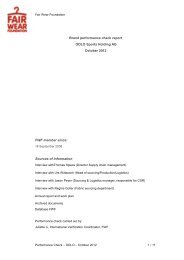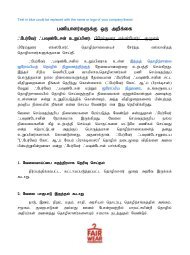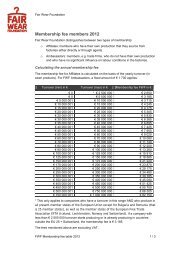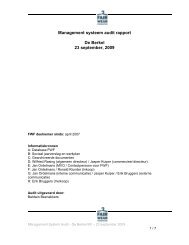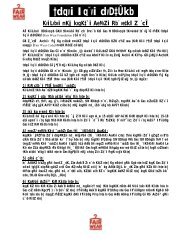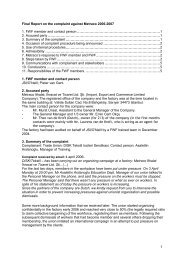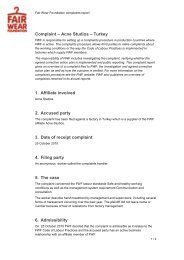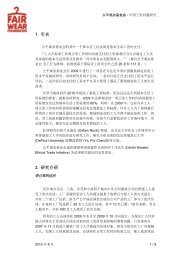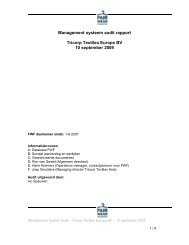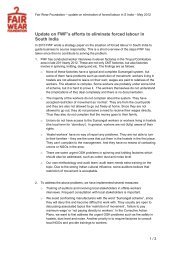Background Study Tirupur - Fair Wear Foundation
Background Study Tirupur - Fair Wear Foundation
Background Study Tirupur - Fair Wear Foundation
You also want an ePaper? Increase the reach of your titles
YUMPU automatically turns print PDFs into web optimized ePapers that Google loves.
workers engaged in work of the same kind at the same time.<br />
• Overtime- If a worker works for more than 9 hours on any day or more than<br />
48 hours in a week, the employer will pay him/her wages at double the rate of<br />
his/her normal wages.<br />
• Limits to Overtime: The total number of hours of work shall not exceed 12 in<br />
any day, 60 in a week. OT shall not exceed 75 hours per quarter. (art. 65.3)<br />
• Women are only allowed to work between 6 a.m. and 7 p.m. and not more than 9 hours a<br />
day.<br />
Negotiable Instruments Act<br />
This Act defines national holidays and any establishment’s responsibility to provide holidays<br />
to their employee.<br />
Five National holidays and three Tamil Nadu State holidays are compulsory for workers and<br />
they should be paid for these holidays. There are some gazette holidays too.<br />
The company must have register on Leave wages. Workers have a right to 15 days of paid<br />
leave a year.<br />
Legal overtime provisions apply for piece rate workers also. The spread over of working<br />
hours should not exceed ten and a half hours.<br />
A register of overtime wages should be maintained by the Management. Mostly there is no<br />
entries in it. Only you could find 'Nil'.<br />
The Inspector of Factories has to verify whether overtime wages are provided to the workers.<br />
HRA (housing rent allowance) can be paid as a % of salary but then the company can deduct<br />
for the numbers of days not worked. If they are paying fixed amounts 500, 300 they can no<br />
do that.<br />
4.6.2. Compliance situation<br />
A typical working week (across all jobs in the industry) would be six days a week<br />
The statutory maximum of 9 working hours a day, 48 hours a week, one-day holiday per<br />
week (Factories Act, Art. 51, 52, 54) is not always respected. Official exemptions are never<br />
asked for. Women are not allowed anyway to work more then 9 hours a day and work after 7<br />
p.m. (or 10 p.m. if State Government has made an exemption, Art. 66). This rule is generally<br />
not kept in the <strong>Tirupur</strong> garment industry.<br />
So, OT is a major issue. The Factories Act says you cannot work for more than 10.5 hours.<br />
Although management will never admit it, it is normal in <strong>Tirupur</strong> that workers work 1.5 shifts a<br />
day, making 12 hours (including breaks). Moreover, workers are not paid overtime at OT bonus<br />
wage of 100% extra as obliged by the Factories Act (art 59). The TEA Agreement allows<br />
1.5 shift (12 hours, including breaks without the 100% bonus). Weekly wages are booked for<br />
12 hours.<br />
The TEA agreement implies if you give overtime you have to give tea BATA, they do not<br />
mention OT payments.<br />
There is no over-time pay recognizable as such - 'tea money' for the last half shift is the only<br />
additional payment. The TEA Agreement provides for a 20% ‘Tea BATA’ (allowance) and<br />
minimum Rs 5/- for half night shift (for those workers who work after 6.00 p.m). and food allowance<br />
of Rs 20 is paid for those workers who work after 9.00 p.m.<br />
At the best, the statutory required OT bonus of 100% extra is only paid for hours beyond this<br />
1.5 shift.<br />
37





